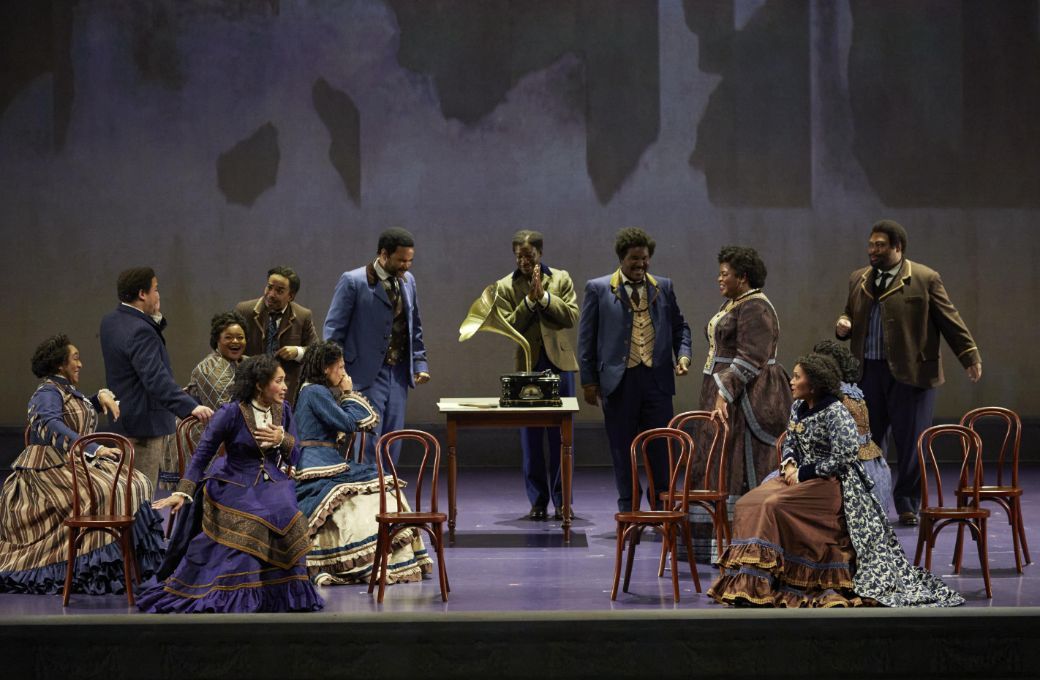Jubilee, Seattle Opera’s send-off for well respected General Director Christina Scheppelmann, proves that the company continues to innovate. This world premiere of a new main stage opera features 40+ African American spirituals at its core and chronicles the story of the formidable post-Civil War Fisk Jubilee Singers, its themes reaching out to an increasingly diverse audience.
As creator and director of Jubilee, writer and director Tazewell Thompson has collected and studied spirituals and believes some of the most beloved American music of the present has its historical roots in these emotion-filled melodies. With his superb libretto, he shows great commitment to the significance and contribution of the Fisk Singers. In their efforts to raise funds for fledgling Fisk University, they endured deprivation, adversity and violence to champion spirituals and disseminate their music around the world, popularizing the musical form they performed. Their perseverance led to the building of Jubilee Hall at Fisk University. Dedicated in 1876 from funds raised on Jubilee tours, the structure is one of the oldest continuously in use for the education of African Americans in the US.
Jubilee features 13 singers performing spirituals that form a living legacy, historically familiar but not often heard on the opera stage. The diegetic choral numbers, those performed by the choir within the narrative world of the opera, were sung a cappella, as they were on the real-life Jubilee tours. The remaining music was accompanied by the Seattle Symphony and debutant conductor Kellen Gray.
Originated by enslaved peoples, these pieces remain iconic symbols of American music through the ages. Emblematic tunes like Swing Low, Sweet Chariot, Wade in the Water, Balm in Gilead and Deep River, beautifully set forth by arranger Dianne Adams McDowell, provided inspiration for the listener and were sung either gently or forcefully, depending on their texts. Some of the numbers were fiendishly difficult with respect to quick tempi and the need for multiple breaths in succession.
The ensemble were represented by a cast of outstanding African American singers who were consistent in the quality of their voices, the deep feelings they displayed in their interpretations and their sheer joy. When singing a cappella, they succeeded in carrying the show by dint of sheer vocal beauty, appealing movements and gestures, and sincere emotional outreach.
Lisa Arrindell played the pivotal role of Ella Sheppard, a former slave on Andrew Jackson’s plantation and tireless reformer who was musically talented and became assistant conductor of the Fisk Singers. Arrindell’s portrayal of multiple roles was forceful and varied, taking full charge of the stage whenever the action focused on her.
Aundi Marie Moore as Maggie Porter, the ensemble’s lead soprano, provided a surprising extra feat: a passionate rendering of an excerpt from the aria “Pace, pace” from Verdi’s La forza del destino, sung with diva-like understanding of the classical operatic form.
Each singer among the exceptional cast displayed their unique quality to stand out individually, yet all the voices blended perfectly in their ensembles. The power of their collective sound kept the audience riveted to the end (kudos to Chorus Master Michaella Calzaretta).
Kellen Gray’s debut was impressive. His gestures, both magnanimous and expressive, maintained an imposing command over the Seattle Symphony in the overture and entr’acte and provided capable and dependable leadership with the singers: a difficult task splendidly executed.

The show's design elements worked together brilliantly to weave the fabric of the story in ways that maintained clarity for the audience, with costume designer Harry Nadal’s elegant creations evoking the post-Civil War period with their clean lines and muted browns and blues, stylish but unpretentious. The use of historical photographs in the epilogue was poignant and fascinating, but the second act seemed overly long and would have been more effective if a few of the spirituals had been judiciously cut. Nonetheless, the premiere undoubtedly proved a triumph for Scheppelmann as the company transitions to a new era.


